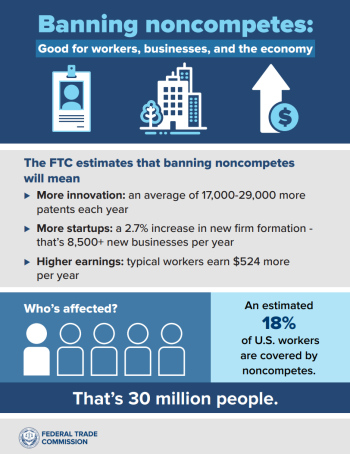Overview
On April 23, 2024, the Federal Trade Commission (FTC) announced a significant step to foster competition in the job market by implementing a final rule that bans non-compete agreements nationwide. This rule aims to uphold workers’ freedom to change jobs, increase innovation, and encourage the formation of new businesses. The final rule will become effective 120 days after publication in the Federal Register.
However, the Final Rule has not yet been published in the Federal Register, and the Final Rule’s implementation has already spurred legal challenges. Trade associations and businesses are anticipated to contest the rule, seeking injunctions against its enforcement. Notably, the rule faces potential constitutional scrutiny, primarily concerning the major questions doctrine, which questions the extent of regulatory power delegated to agencies by Congress.
Non-compete agreements have been identified as a widespread practice affecting around 30 million workers, limiting their mobility and options. Under the new rule, existing non-competes for the vast majority of workers will become unenforceable, except for senior executives representing less than 0.75% of workers.
The FTC received significant public feedback during the rulemaking process, with the majority supporting the ban on non-competes. The Commission found that alternatives such as trade secret laws and non-disclosure agreements (NDAs) offer adequate protection for employers’ interests without the negative impacts associated with non-competes.
Overall, the FTC’s action aims to promote competition, protect worker rights, and stimulate economic growth by eliminating barriers to job mobility and innovation.
Impact on Employment Terms
 The FTC’s rule banning non-compete agreements is likely to have a significant impact on employment terms across various sectors. Here are some anticipated effects:
The FTC’s rule banning non-compete agreements is likely to have a significant impact on employment terms across various sectors. Here are some anticipated effects:
Increased Job Mobility: With non-compete agreements banned, employees will have more freedom to change jobs without fear of legal repercussions. This increased job mobility could lead to a more dynamic labor market as workers seek better opportunities and employers compete for talent.
Higher Wages: The FTC estimates that the ban on non-competes could lead to higher earnings for workers, with the average worker potentially earning an additional $524 per year. Increased job mobility and competition for talent may prompt employers to offer higher wages and better benefits to attract and retain employees.
Improved Working Conditions: In addition to offering higher wages, employers may improve working conditions to attract and retain employees in the absence of non-compete agreements. This could include benefits such as flexible scheduling, remote work options, and professional development opportunities.
Stimulated Innovation: non-compete agreements have been shown to stifle innovation by restricting employees’ ability to move between companies and share knowledge and ideas. With non-competes banned, employees have more freedom to pursue entrepreneurial ventures and collaborate with colleagues from different organizations, potentially leading to increased innovation across industries.
Easier Entry into Entrepreneurship: Non-compete agreements can be a significant barrier to entrepreneurship, as they restrict employees’ ability to start their own businesses in related fields. By eliminating non-competes, the FTC’s rule may encourage more individuals to start their own businesses, leading to increased entrepreneurship and economic growth.
Shift in Hiring Practices: Employers may need to adjust their hiring practices and employment contracts in response to the ban on non-competes. Instead of relying on non-competes to protect their interests, employers may turn to other forms of protection such as non-disclosure agreements (NDAs) and trade secret laws.
Impact on Equity Arrangements
The FTC’s rule banning non-compete agreements could have several implications for equity arrangements in the workplace:
Incentivizing Equity Participation: With non-compete agreements no longer restricting employees’ ability to leave and join other companies, employers may use equity arrangements as a stronger incentive for talent retention. Equity ownership, such as stock options or equity grants, can align employees’ interests with those of the company and encourage them to contribute to its long-term success.
Greater Employee Mobility: Employees who hold equity in their current company may feel more empowered to explore new opportunities knowing that non-compete agreements are no longer a barrier. This increased mobility could lead to a more fluid exchange of talent between companies, potentially benefiting both employees and employers.
Enhanced Entrepreneurship: Employees who receive equity as part of their compensation may be more inclined to pursue entrepreneurial ventures in the absence of non-compete agreements. Equity ownership can provide a financial cushion and incentive for employees to take risks and start their own businesses, contributing to increased entrepreneurship and innovation.
Adjustment of Equity Terms: Employers may reassess the terms of equity arrangements in light of the ban on non-competes. For example, companies may introduce clawback provisions or vesting schedules to protect their interests in case employees leave to join competitors. Alternatively, employers may offer more favorable equity terms to employees to compensate for the removal of non-compete agreements.
Impact on Equity Valuation: The ban on non-compete agreements could impact the valuation of equity in companies, particularly in industries where non-competes were commonly used to protect intellectual property and proprietary information. Investors and stakeholders may reassess the risk associated with equity investments in light of increased employee mobility and potential competition.
Key Takeaways:
- Non-compete agreements with senior executives will remain enforceable under the new rule.
- Non-compete agreements in purchase and sale transactions, both existing and new, will continue to be enforceable as long as they are not considered a de facto condition of employment.
- Non-compete agreements will remain enforceable during the term of employment; the ban on enforcement only applies once employment ends.
- Employers are required to notify all workers (excluding senior executives) before the rule’s effective date that their non-compete agreements are no longer enforceable.


